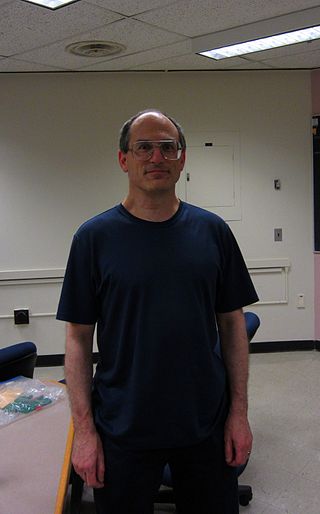Related Research Articles

Computer-Aided Design (CAD) is the use of computers to aid in the creation, modification, analysis, or optimization of a design. This software is used to increase the productivity of the designer, improve the quality of design, improve communications through documentation, and to create a database for manufacturing. Designs made through CAD software are helpful in protecting products and inventions when used in patent applications. CAD output is often in the form of electronic files for print, machining, or other manufacturing operations. The terms computer-aided drafting (CAD) and computer-aided design and drafting (CADD) are also used.

Computer-aided engineering can be defined as the general usage of technology to aid in tasks related to engineering analysis. Any use of technology to solve or assist engineering issues falls under this umbrella.

Finite-difference time-domain (FDTD) or Yee's method is a numerical analysis technique used for modeling computational electrodynamics. Since it is a time-domain method, FDTD solutions can cover a wide frequency range with a single simulation run, and treat nonlinear material properties in a natural way.

Computational electromagnetics (CEM), computational electrodynamics or electromagnetic modeling is the process of modeling the interaction of electromagnetic fields with physical objects and the environment using computers.
Dassault Systèmes Simulia Corp. is a computer-aided engineering (CAE) vendor. Formerly known as Abaqus Inc. and previously Hibbitt, Karlsson & Sorensen, Inc., (HKS), the company was founded in 1978 by David Hibbitt, Bengt Karlsson and Paul Sorensen, and has its headquarters in Providence, Rhode Island.

Ansys HFSS, is a commercial finite element method solver for electromagnetic (EM) structures from Ansys that offers multiple state-of-the-art solver technologies. Each solver in ANSYS HFSS is an automated solution processor for which the user dictates the geometry, properties of the material and the required range of solution frequencies.
A surrogate model is an engineering method used when an outcome of interest cannot be easily measured or computed, so an approximate mathematical model of the outcome is used instead. Most engineering design problems require experiments and/or simulations to evaluate design objective and constraint functions as a function of design variables. For example, in order to find the optimal airfoil shape for an aircraft wing, an engineer simulates the airflow around the wing for different shape variables. For many real-world problems, however, a single simulation can take many minutes, hours, or even days to complete. As a result, routine tasks such as design optimization, design space exploration, sensitivity analysis and what-if analysis become impossible since they require thousands or even millions of simulation evaluations.
PathWave Design is a division of Keysight Technologies that was formerly called EEsof. It is a provider of electronic design automation (EDA) software that helps engineers design products such as cellular phones, wireless networks, radar, satellite communications systems, and high-speed digital wireline infrastructure. Applications include electronic system level (ESL), high-speed digital, RF-Mixed signal, device modeling, RF and Microwave design for commercial wireless, aerospace, and defense markets.
Compact Software was the first commercially successful microwave computer-aided design (CAD) company. The company was founded in 1973 by Les Besser to commercialize his eponymous program COMPACT, released when he was at Farinon Electric Company.
AWR Corporation is an electronic design automation (EDA) software company, formerly known as Applied Wave Research, and then acquired by National Instruments

Jacob K. White is the Cecil H. Green Professor of Electrical Engineering and Computer Science at the Massachusetts Institute of Technology. He researches fast numerical algorithms for simulation, particularly the simulation of circuits. His work on the FASTCAP program for three-dimensional capacitance calculation and FASTHENRY, a program for three-dimensional inductance calculations, is highly cited. He has also done extensive work on steady-state simulation of analog and microwave circuits. White was a significant early contributor to the development of Spectre and SpectreRF.
In numerical analysis, coarse problem is an auxiliary system of equations used in an iterative method for the solution of a given larger system of equations. A coarse problem is basically a version of the same problem at a lower resolution, retaining its essential characteristics, but with fewer variables. The purpose of the coarse problem is to propagate information throughout the whole problem globally.
Microwave engineering pertains to the study and design of microwave circuits, components, and systems. Fundamental principles are applied to analysis, design and measurement techniques in this field. The short wavelengths involved distinguish this discipline from electronic engineering. This is because there are different interactions with circuits, transmissions and propagation characteristics at microwave frequencies.
Simcenter Amesim is a commercial simulation software for the modeling and analysis of multi-domain systems. It is part of systems engineering domain and falls into the mechatronic engineering field.
The space mapping methodology for modeling and design optimization of engineering systems was first discovered by John Bandler in 1993. It uses relevant existing knowledge to speed up model generation and design optimization of a system. The knowledge is updated with new validation information from the system when available.

John William Bandler is a Canadian professor, engineer, entrepreneur, artist, speaker, playwright, and author of fiction and nonfiction. Bandler is known for his invention of space mapping technology and his contributions to device modeling, computer-aided design, microwave engineering, mathematical optimization, and yield-driven design.

pSeven is a DSE software platform developed by DATADVANCE that features design, simulation and analysis capabilities and assists in design decisions. It provides integration with third party CAD and CAE software tools, multi-objective and robust optimization algorithms, data analysis, and uncertainty quantification tools.
Optimization Systems Associates (OSA) was founded by John Bandler in 1983. OSA produced the first commercial implementation of space mapping optimization to enhance the speed and accuracy of engineering design. OSA’s primary thrust was in computer-aided design (CAD) and simulation and optimization of radio-frequency and microwave circuits and systems. Its products included developments of Bandler's space mapping concept and methodology, which facilitates effective modeling and design optimization of computationally intensive engineering systems.
Nuno Miguel Gonçalves Borges de Carvalho from the Universidade de Aveiro, Aveiro, Portugal was named Fellow of the Institute of Electrical and Electronics Engineers (IEEE) in 2015 for contributions on characterization and design of nonlinear RF circuits.

Fusion 360 is a commercial computer-aided design (CAD), computer-aided manufacturing (CAM), computer-aided engineering (CAE) and printed circuit board (PCB) design software application, developed by Autodesk. It is available for Windows, macOS and web browser, with simplified applications available for Android and iOS. Fusion 360 is licensed as a paid subscription, with a free limited home-based, non-commercial personal edition available.
References
- ↑ J.W. Bandler, "Optimization methods for computer-aided design," IEEE Trans. Microwave Theory Tech., vol. 17, no. 8, pp. 533-552, Aug. 1969.
- ↑ M.B. Steer, J.W. Bandler and C.M. Snowden, “Computer aided design of RF and microwave circuits and systems,” (invited), IEEE Trans. Microwave Theory Tech., vol. 50, no. 3, pp. 996-1005, Mar. 2002.
- ↑ "Spread Spectrum Scene Online - CAD / CAE STUFF Page".
- ↑ Pedro, José Carlos; Carvalho, Nuno Borges (November 2004). "An integrated overview of CAD/CAE tools and their use on wireless-communication circuit design: Research Articles". International Journal of RF and Microwave Computer-Aided Engineering. 14 (6): 507–524. doi: 10.1002/mmce.20039 .
- ↑ Rhodes, D.; Perlman, B. (May 1999). "Parallel computation for microwave circuit simulation". IEEE Transactions on Microwave Theory and Techniques. 45 (5): 587–592. doi:10.1109/22.575573.